
A nearly empty duty-free shop in Seoul on Sept. 29. (Yonhap)
Korean duty-free shops, hit hard by protracted COVID-19 lockdowns in China, are seeking to reduce their reliance on Chinese sales, turning their eyes to alternative markets like Southeast Asia.
Before the pandemic, China’s deep-pocketed tourists and resellers used to be their key revenue sources that made up more than 80 percent of their sales.
With the resumption of international travel around the world, local retailers, especially the top two Lotte and Shinsegae, had pinned high hopes on the potential return of Chinese travelers to make up their huge pandemic losses.
Still, there seems few signs of recovery as the Chinese government still maintains strict travel restrictions.
Having already experienced several China disruptions, duty-free business operators are searching for breakthroughs.
Lotte Duty Free, the largest duty-free business operator by sales, is making efforts to boost sales at downtown duty-free shops in Singapore, Vietnam and other countries that show gradual recovery of international travel.
“Before the coronavirus pandemic, Chinese travelers made up most of the sales at the Singapore branch. But now, with a growing number of transit and departing passengers, we think the city has greatly reduced its reliance on Chinese sales,” a Lotte Duty Free official said.
This month, Lotte is poised to open its first downtown duty-free shop in Da Nang, Vietnam. It plans to open the second branch in the capital city Hanoi by the first half of next year.
The official said a number of tourists with high spending power are coming from Southeast Asia such as Malaysia, Indonesia and Thailand. “Vietnam will be at the forefront of catering to rising demand of luxury, fashion, beauty and liquor from the region.”
Also, the Vietnamese government is promoting an aggressive travel policy with the goal of bringing in more than 5 million foreign visitors this year. As of August, 1.4 million travelers visited the country, according to data from General Statistics Office of Vietnam.
Piggybacking on “hallyu,” or the global boom of Korean entertainment, duty-free shops are also coming up with marketing strategies targeting a broader customer base as well.
Shinsegae Duty Free has introduced Korean fashion brands that became famous after Korean celebrities were spotted wearing their items. Sales of OIOI and Evisu surged on-year by 164 percent and 101.3 percent as of August, respectively. Sales of Nerdy, a street fashion brand made in partnership with K-pop idol Taeyeon, jumped 60 percent in the cited period.
“There might be a silver lining if China decides to dial down the lockdown on Oct. 16 when the country’s party congress is held. But in the long run, we think it’s safe to be less dependent on sales generated by Chinese resellers,” said an official from duty-free shop who wished to remain anonymous.
According to data from the Financial Supervisory Service, Lotte Duty Free has logged an operating loss of 89.2 billion won ($61.9 million), down 1,494 percent from 2021’s 6.4 billion eon, as of the first half of this year.
Noting that the duty-free business accounts for approximately 80 percent of Hotel Lotte’s sales revenue, its strong underperformance dragged down the hotel brand’s second-quarter earnings.
Hyundai Department Store Duty Free’s operating loss also surged 79.2 percent on-year to 13.8 billion won, in the cited period.
On the other hand, the two duty-free shops – Shilla and Shinsegae – have generated profit of 24.5 billion won and 22.6 billion won after selling stock products through online platforms.





![[From the Scene] Monks, Buddhists hail return of remains of Buddhas](http://res.heraldm.com/phpwas/restmb_idxmake.php?idx=645&simg=/content/image/2024/04/19/20240419050617_0.jpg&u=20240419175937)
